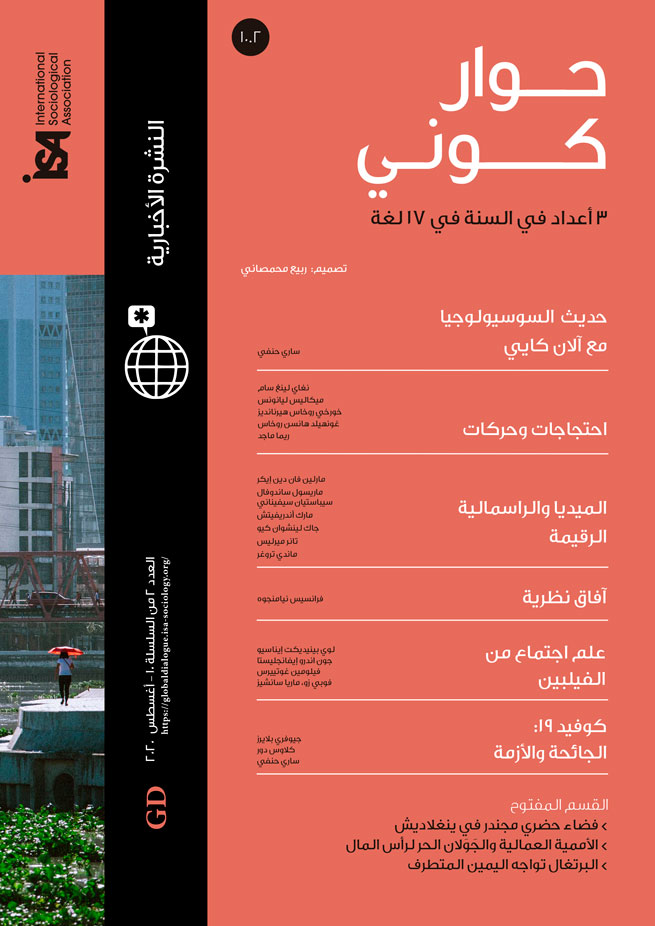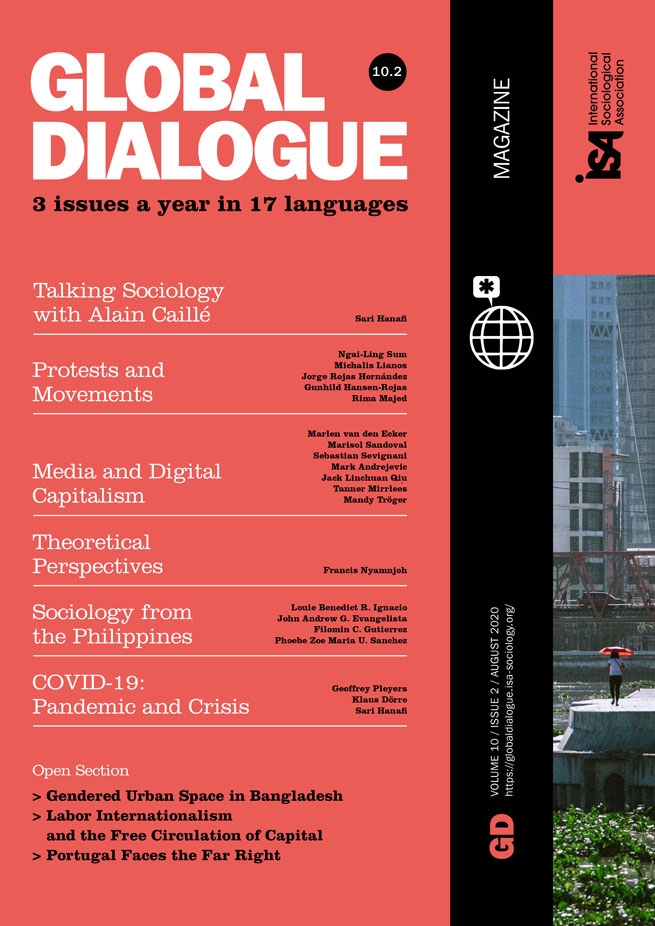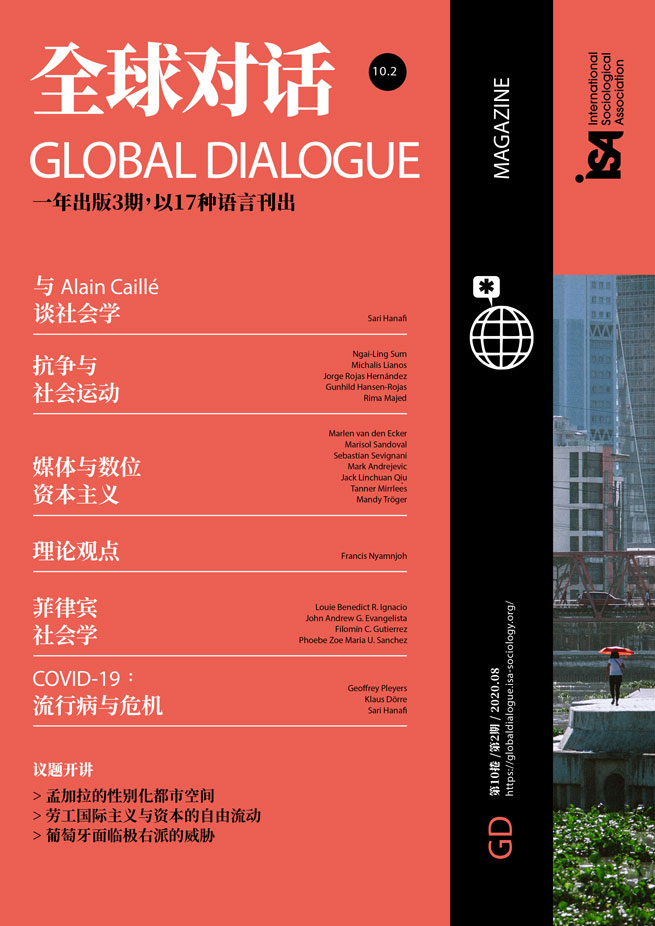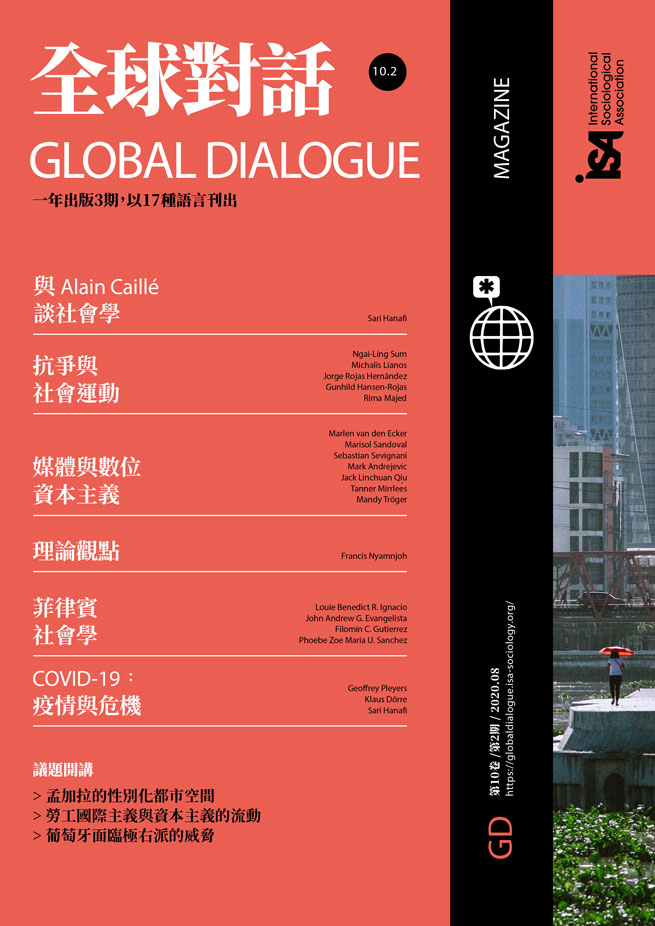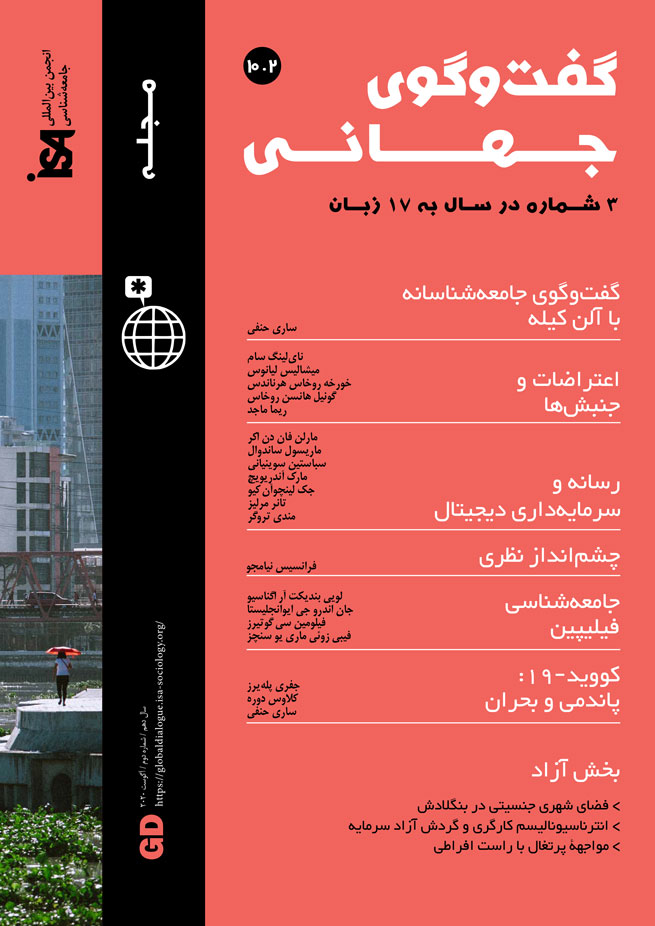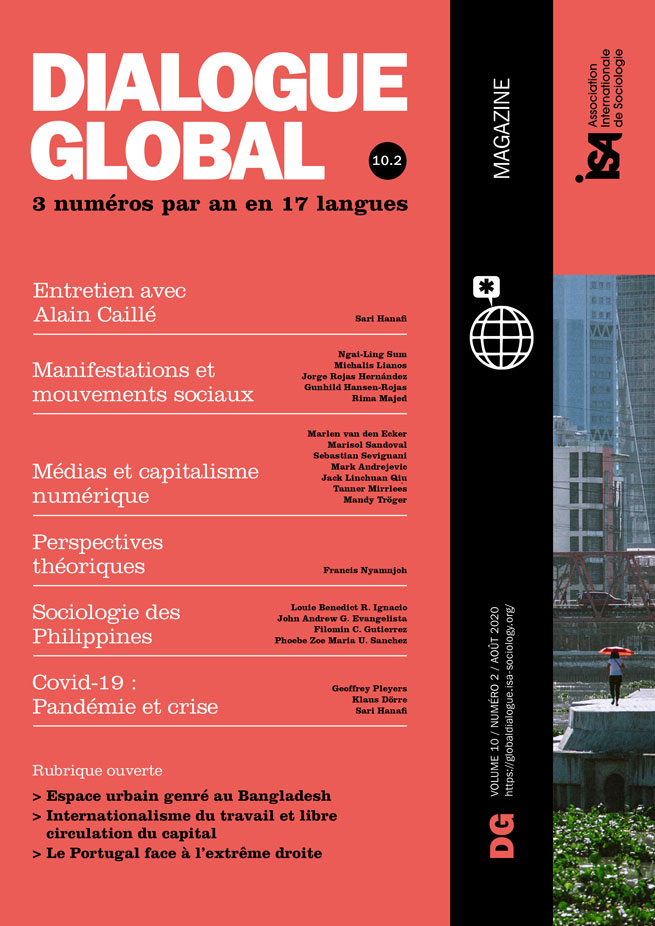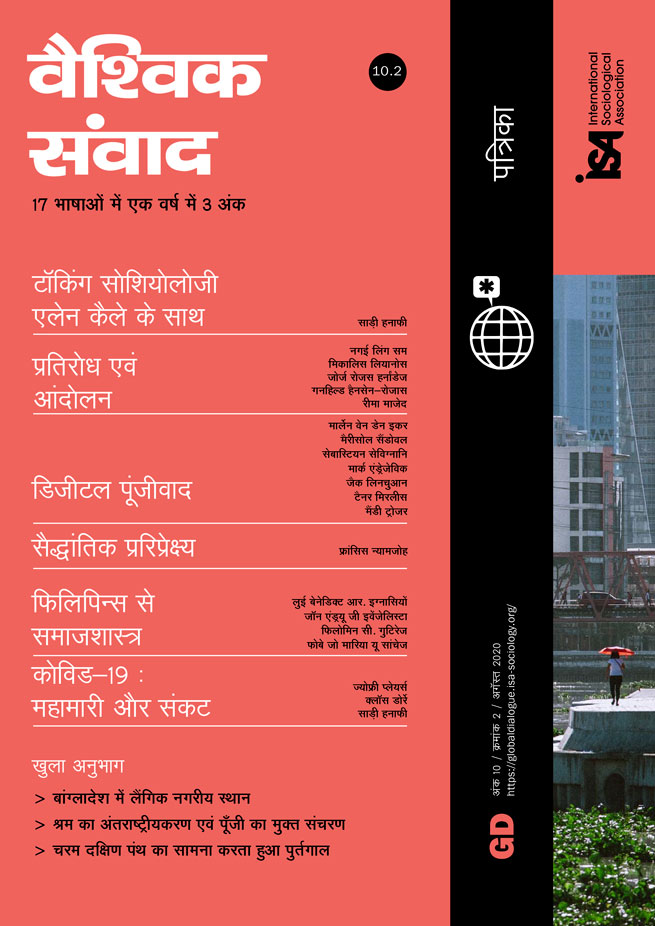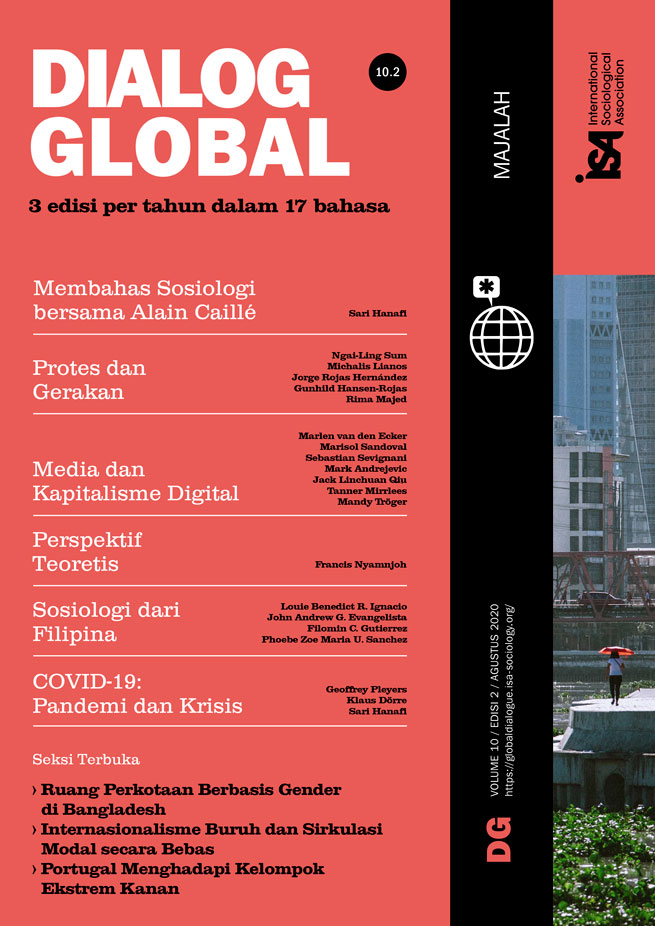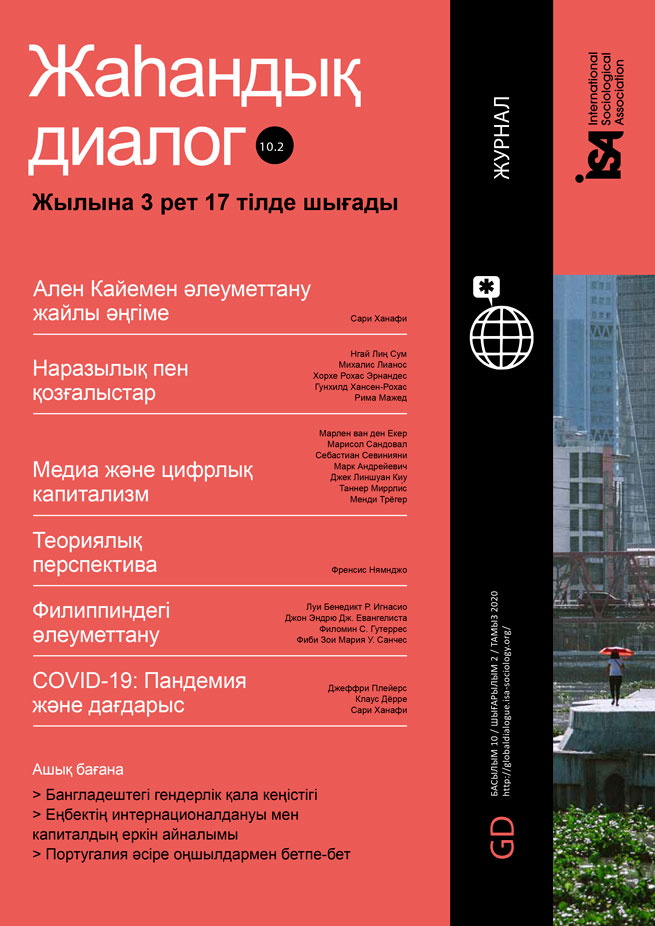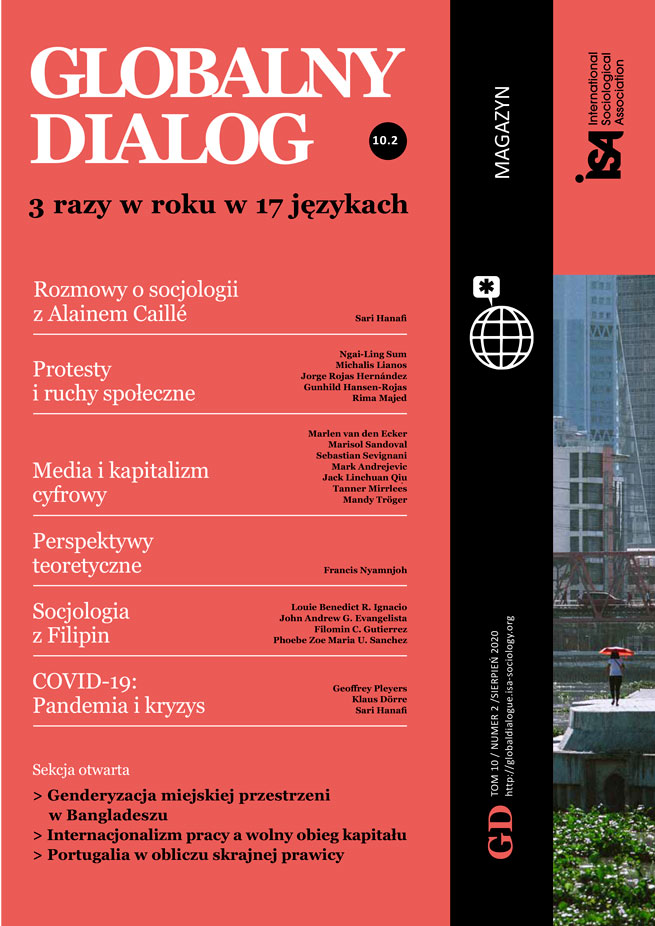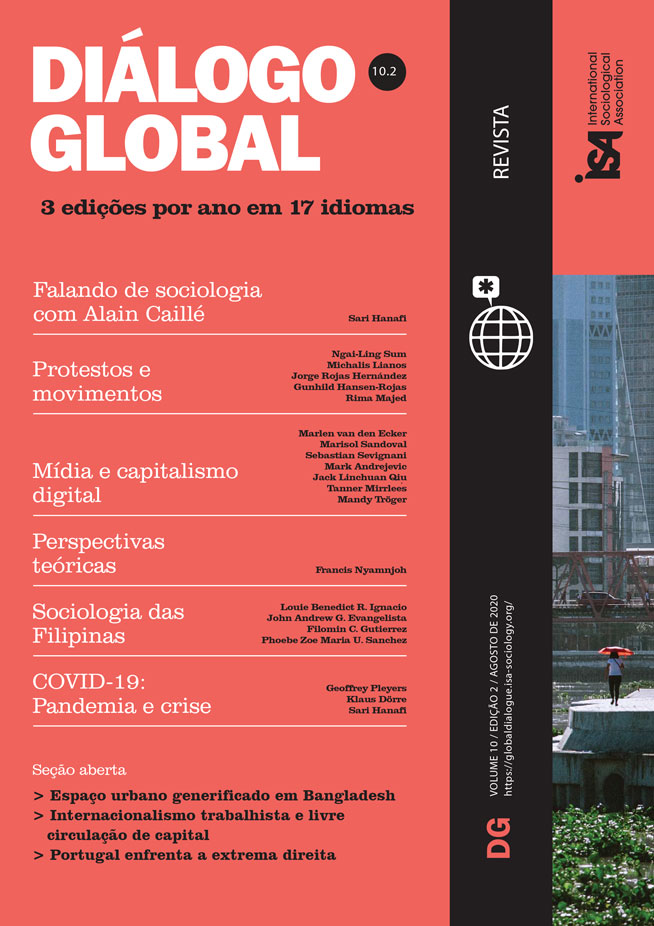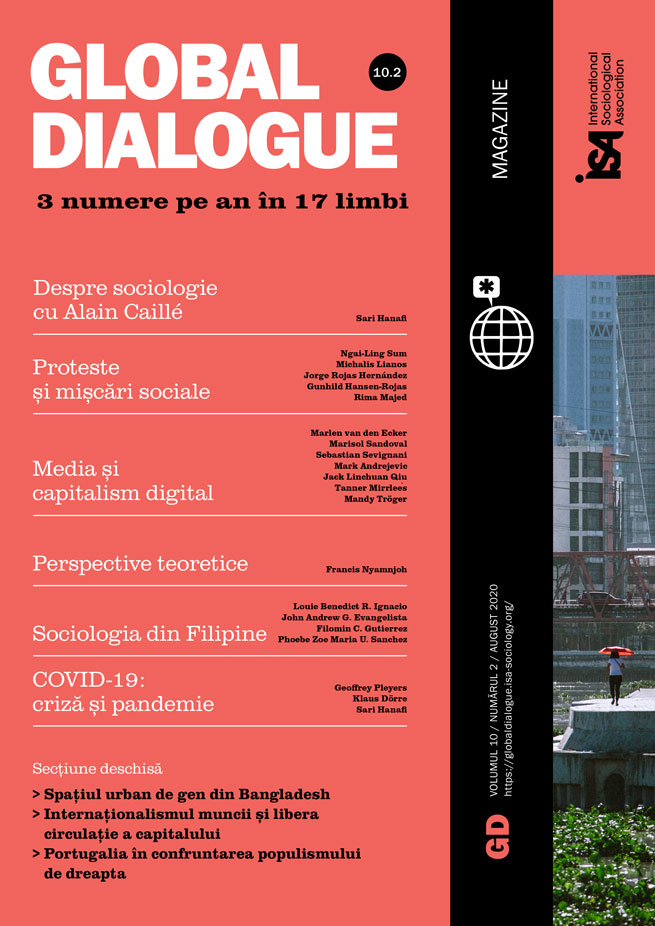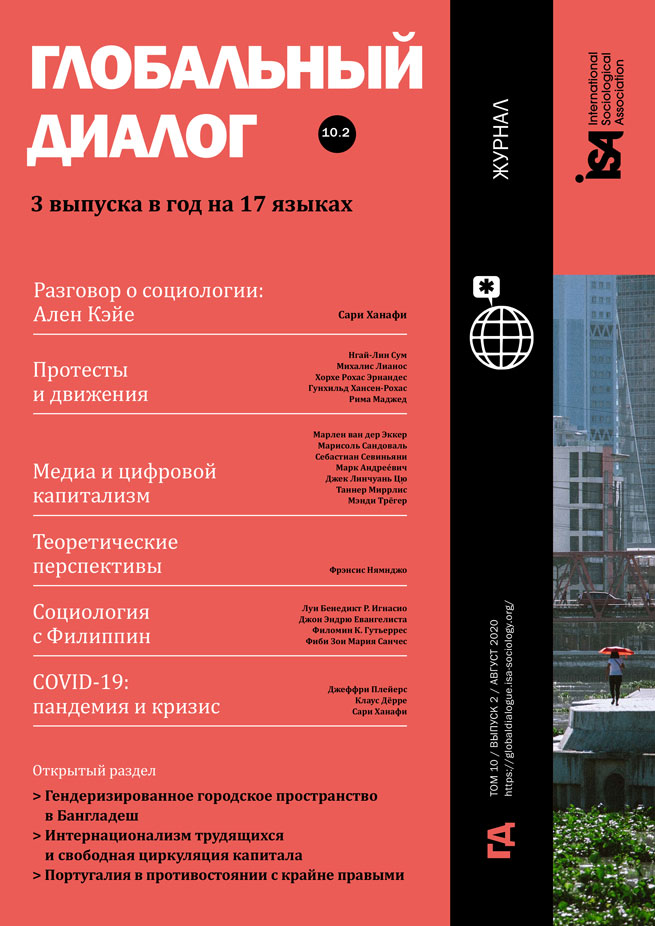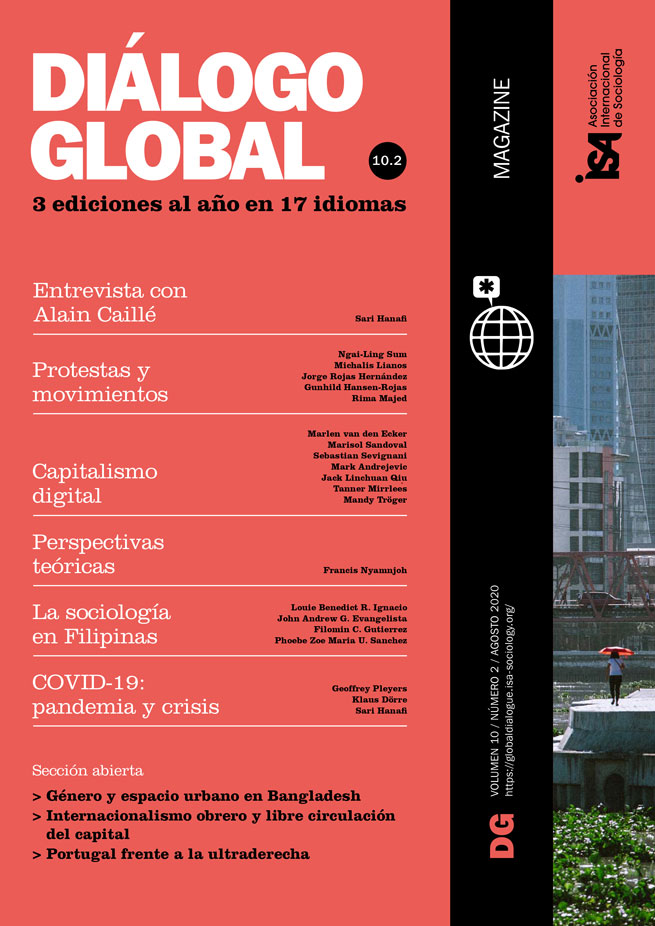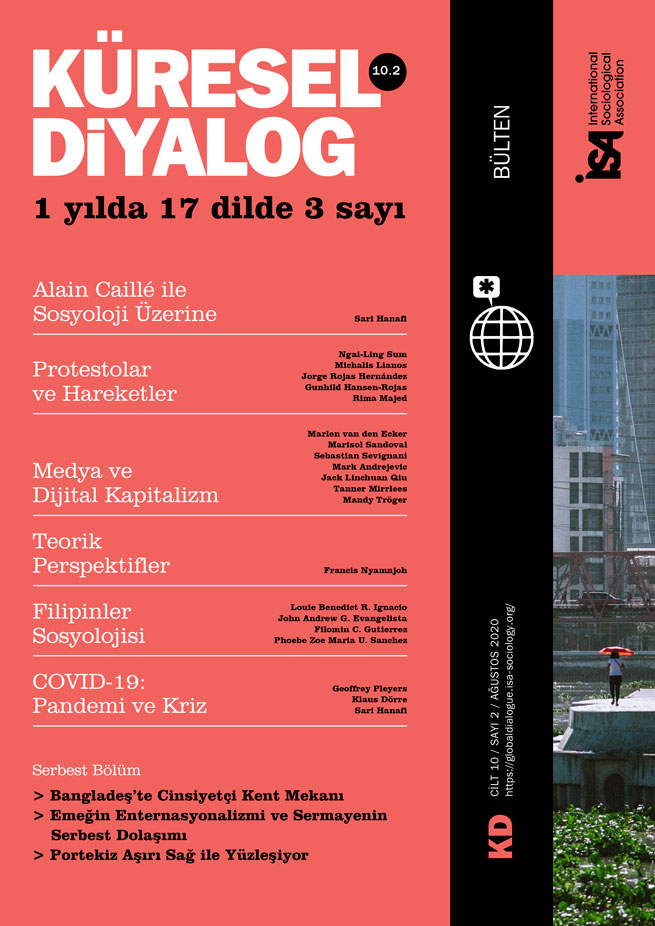The Convivialist Manifesto: A New Political Ideology. An Interview with Alain Caillé
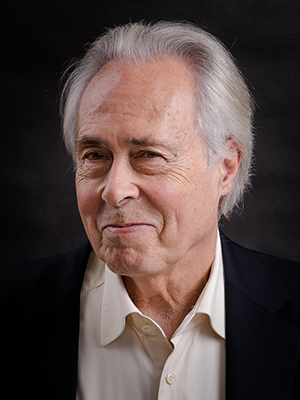
June 26, 2020
Alain Caillé is Emeritus Professor of Sociology at the University of Paris Ouest Nanterre La Défense and editor of La Revue du MAUSS (Anti-Utilitarian Movement in Social Science). He is known for his radical criticism of contemporary economics and utilitarianism in the social sciences. He is the originator of the Convivialist Manifesto. On the occasion of the release of the second version of this manifesto (Internationale convivialiste, Second Manifeste convivialiste. Pour un monde post-néolibéral, February 2020), Sari Hanafi, President of the International Sociological Association (ISA) conducted this interview with him.
SH: Could you introduce the Convivialist Manifesto to our readers?
AC: Before talking about its content, it is worth noting that this Second Convivialist Manifesto is co-signed by nearly 300 intellectuals (economists, philosophers, sociologists, community activists) and artistic personalities from 33 different countries. They form the embryo of a kind of Convivialist International (the name that has been chosen to designate the collective author of the Manifesto). An International, totally informal, with no office, no organization (just some goodwill) and no funding, but which has been active in extending the manifesto well beyond the 300 initial signatories, to other intellectuals, activists, and artists, and, above all, to provoke a decisive shift in world public opinion. For several decades, we have been living under the influence, under the hegemony, as Gramsci would have said, of the neoliberal ideology that prevents us from imagining a world other than our own, entirely submitted to the injunctions of a rentier and speculative capitalism. By its very nature, this generates vertiginous inequalities, which, day after day, empty the democratic ideals of their content. Except in countries that are trying to get rid of their dictators, there is less and less “belief” in these ideals, especially among young people. This is obviously catastrophic. Democracy is now under threat just about everywhere in the world, just as it was in Europe in the 1930s. With it, everything that is part of critical thinking, starting with sociology, is in danger of disappearing.
SH: Why is the neoliberal ideology so powerful?
AC: It is supported, of course, by gigantic material, economic, financial, military, police, media, and sometimes criminal resources. But there is also another factor, less well-perceived but essential, which is the raison d’être of convivialism: to this date, there is no alternative ideology, no more or less coherent set of ideas, concepts, theories, and values in the name of which could gather all those, countless in number, who aspire to something other than a world governed solely by financial and speculative logic. A world, as we know well, that is on the verge of tipping over into irremediable climatic and environmental disasters. In rich countries, young people are increasingly aware of the imminence of these ecological perils, but they do not see, or do not clearly perceive, that we will not be able to face them without calling into question the hegemony of neoliberalism and without, in order to do so, giving new life to the democratic imagination.
In an ideal-typical way, let us say that the neoliberal ideology is organized around the following six propositions: 1) There are no societies, only individuals. 2) Greed is good. 3) The richer a society is, the better it is, because everyone will benefit by a trickle-down effect. 4) The only desirable mode of coordination between human subjects is the free market, including the self-regulated financial and speculative market. 5) There are no limits. More necessarily means better. 6) There is no alternative. What is surprising is that none of these propositions has any real theoretical or empirical consistency. And yet we are not sure what to oppose them.
SH: How do you explain this?
AC: If we remain impotent in the face of neoliberalism, it is because the great modern political ideologies, of which we are heirs: liberalism, socialism, communism, anarchism (and that we combine them as we wish) are no longer capable of dealing with the problems we have to face today. There are at least three reasons for this: 1) All these ideologies, at least in their main variants, are based on the premise that humans are first and foremost beings of need, and that conflicts between them are caused by material scarcity, leading to the deduction that the first imperative is to produce ever more. 2) This “solution” could make sense as long as nature appeared inexhaustible and infinitely exploitable (as long as we were not under the threat of secular stagnation [a condition when there is negligible growth in a market-based economy] which many economists diagnose). We now know that this is not the case. 3) In perceiving us as needy creatures, these ideologies ignore that the other source of conflict, at least as important as material scarcity, is the desire for recognition. As a result, they tell us nothing about the possible ways in which different cultures and religions can coexist, either between or within countries – not to mention the relationships between men and women.
The term “convivialism” can therefore be seen at the very least as an empty signifier (the equivalent of mana according to Lévi-Strauss...) symbolizing the hope of a new political ideology in which all those who aspire to build a post-neoliberal world can recognize themselves, each one putting under this term their own aspirations and interests.
SH: But is the term “convivialism” the best terminological choice to name a new political ideology?
AC: Is this the right word? And is neoliberalism really the problem? Is it the right word? In English and French, conviviality is the art of eating with friends and having a good time together. The word conviviality therefore has a slightly “nice” connotation, which repels some of our potential supporters. However, we couldn’t think of a better term for a philosophy of living together (of conviviality) that helps us to ask how people can and should cooperate by “opposing without slaughtering each other” (as Marcel Mauss put it). Is it the right problem? Some of the scholars we contacted gave up on signing, saying that the crucial problem today is not the hegemony of neoliberalism but the rise of populism. This latter is indeed a result of neoliberal hegemony, its other side in a way. One only has to reread Karl Polanyi’s The Great Transformation to be convinced of this.
SH: What are the fundamental principles of convivialism?
AC: “Convivialism” is not only an empty signifier, a symbol of hope. For my part, I am glad at the fact that extremely diverse intellectual personalities – of rather liberal or socialist inspiration for some, communist or anarchist for others, not to mention different religious traditions – have been able to agree on five ultimate values or principles, which I cannot detail here: the principles of common nature, common humanity, common sociality, legitimate individuation, and creative opposition (“to cooperate by opposing without slaughtering each other”). These five principles draw a common axiological space that circumscribes the field of possible legitimate political choices. They temper each other. But all of them are subordinated to an imperative that can be said to be categorical: that of the necessary mastery against excessiveness and hubris. Humanity has very little time left to learn how to control its propensity to hubris. Perhaps the priority task of sociology is to help it do so.
SH: Does your sociology constitute a call to connect sociology with moral philosophy?
AC: Among other things, yes. I can’t read the great classics of sociology, Marx, Tocqueville, Weber, Durkheim, etc., other than as moral and political philosophers, albeit of a rather peculiar kind. Philosophers who, unlike Hobbes or Rousseau (who said: “Let’s set aside all the facts”), are concerned about facts and their historicity. They are also concerned about anthropology. How can we understand our present without seeing what remains in it from past social forms? Hence my interest in Marcel Mauss, who shows us how early societies organized themselves to distribute recognition to their members in proportion to their gifts or their participation in the field of what the phenomenological tradition calls donation. A field of which mana is the best known expression. Without this dimension of moral philosophy, the classics would not speak to us and would no longer interest us. A sociology which would limit itself to wanting to establish facts – an infinite task (which facts? how? why?) – would run dry and would condemn itself to insignificance.
SH: Among the moral entrepreneurs are the religious authorities. Do you plan to discuss/collaborate with them?
AC: My conviction is that our only chance to avoid the disasters – ecological, economic, financial, social, political and moral – that threaten us, is a global awareness of the magnitude and urgency of the issues at stake. Against the damages generated by the financial and speculative capitalism that is now dominant (you will have noticed that I am not saying anything about capitalism in general...) we must succeed in mobilizing a majority public opinion in as many countries as possible. I am not saying that it will be easy or that we have a great chance of success, but it is obvious that we will not have any without the support of religious authorities. That is why the Second Manifesto quotes fairly long passages from a declaration, Human Fraternity for World Peace and Living Together, co-signed on February 4, 2019 by Pope Francis, in the name of the Christians, and by the Grand Imam of al-Azhar (Egypt), Ahmad al-Tayyeb, in the name of the Muslims. And I do not see why Protestant, Buddhist, Jewish, etc., moral authorities could not be associated with it. Perhaps we should try to create promptly something like a World Assembly of Common Humanity, comprising representatives of world civil society, of philosophy, of the so-called “exact” sciences, of the human and social sciences, and of the different ethical, spiritual, and religious currents which would recognize themselves in the principles of convivialism. It seems to me that the ISA (International Sociological Association) could play an eminent role here.
SH: Has the reflection on this manifesto been verified as to its usefulness/validity for the Global South? Has any research been conducted in these countries?
AC: I would answer yes and no. Yes, because a significant number of signatories come from what you call the Global South and because a number of friends from the South have been associated with the convivialism initiative since the first Manifesto (2013). And no, unfortunately, because most of the writing and drafting work was done in the North. An important step now is that of an appropriation and enrichment of the convivialist reflection by the South. Translations are being made into Portuguese and Spanish (in addition to English, German, Italian, and Japanese), and friends are expected to take them to Argentina, Brazil, Mexico, but also, I hope, to India, Africa, etc. A translation into Arabic would be particularly important, for many reasons. But let’s get to the point. I would say that this Second Manifesto lays the foundation for a post-neoliberal consensus on crucial ecological, economic, and political issues. This is already good. But there is still a lot of work to be done to integrate all the debates carried by postcolonial, gender, subaltern, cultural perspectives. This would be a Third Convivialist Manifesto (which too would end up needing renewal), or at least what we could call a Supplement to the Convivialist Manifestoes. And here the contribution of the South will be totally indispensable.
SH: Are you optimistic about the spreading of convivialism?
AC: It seems to me that the Second Convivialist Manifesto lays the foundation of the political philosophy that we now urgently need. But a political philosophy does not make a policy. In order to go further, it is now necessary for “political entrepreneurs” to take hold of it and to show in each country in concrete terms what almost everybody (ordinary employees, precarious workers, small traders or entrepreneurs, segregated populations, etc.) would gain from convivialism. If, in all these social categories, more people start to think to themselves and to say to each other “I am a convivialist,” then we will have a chance to avoid the disasters that await us.
SH: Thanks Alain, I wish you all the best for your Convivialist Manifesto.
Alain Caillé <alaincaille90@gmail.com>
Sari Hanafi <sh41@aub.edu.lb>

